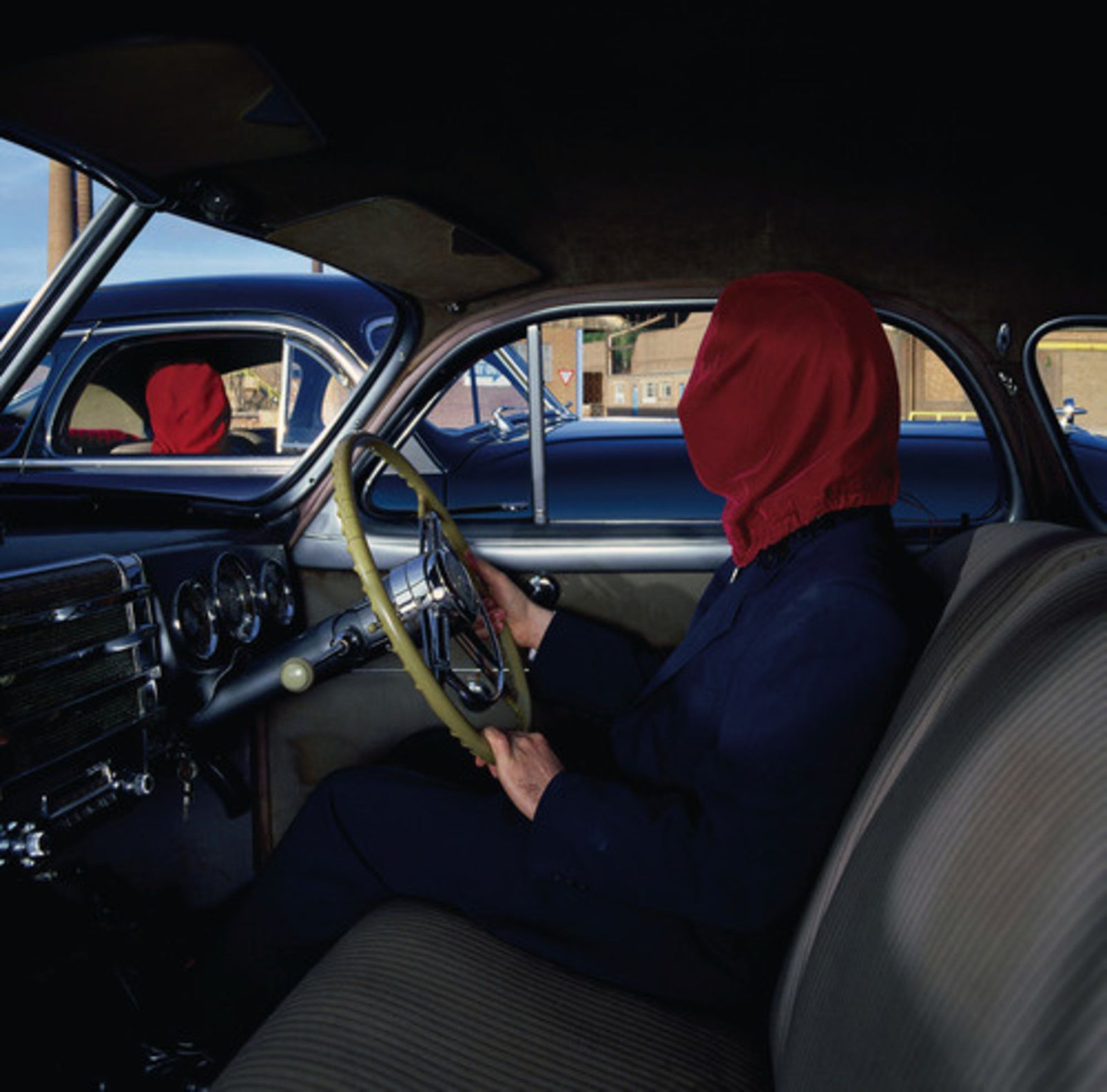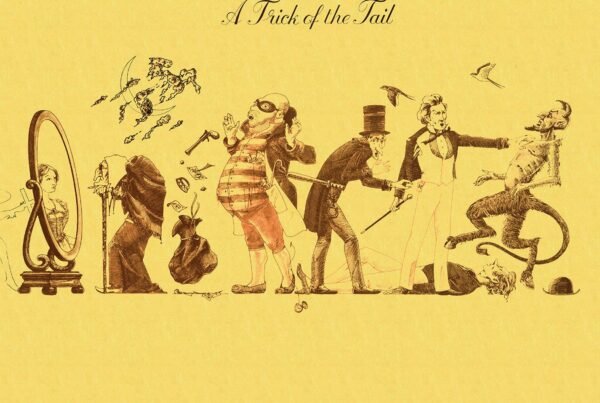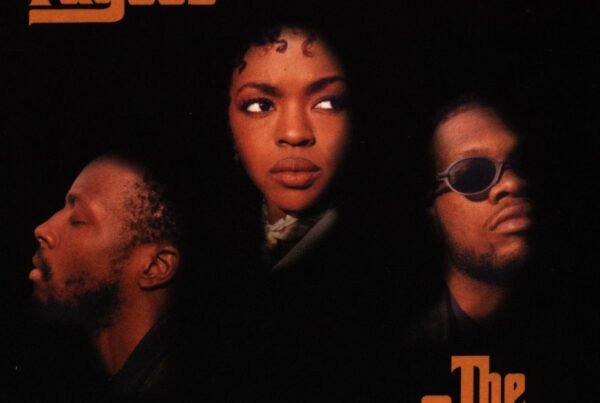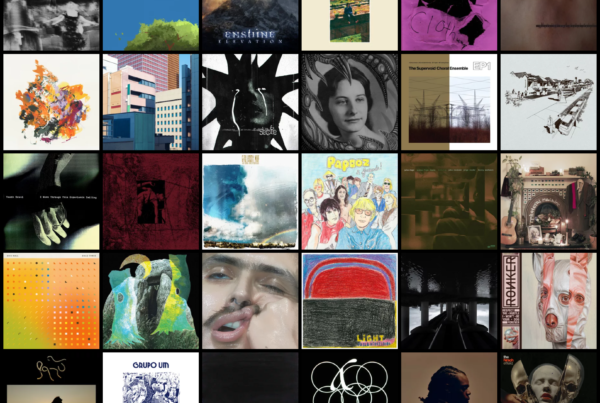‘Hearing music like this will do something to a motherfucker, especially if they’re young.‘

Release date: February 11, 2005 | Universal Records | Facebook | Instagram | Twitter | Website
It was only a matter of time before we got a repeat artist on A Scene In Retrospect, and what way to kick in that proverbial door! The Mars Volta‘s enigmatic progressive rock exploded unto the scene with De-Loused In The Comatorium, but its 2005 follow-up Frances the Mute upped the ante in terms of sheer strangeness and sonic experimentation, propelling TMV even further into spheres not ordinarily reserved for adventurous acts such as themselves.
Broc Nelson
The Mars Volta’s success is frankly still astonishing to me. Formed in the wake of the breakup of At The Drive-In, whose Relationship Of Command stands as one of the most influential albums for my own musical tastes and journey, The Mars Volta were a band I was ecstatic to follow for several years. I was fortunate to see them (the first time) after the release of their debut Tremulant EP as an opening act for the Red Hot Chili Peppers. It felt like it was just me and like two other people in attendance that cared or even liked their frenetic, experimental performance.
Not long after that, De-Loused In The Comatorium was released, gaining the band critical attention and even more fans. That album is still an absolute triumph, but it was 2005’s Frances The Mute that became The Mars Volta’s biggest commercial success debuting at #4 on the Billboard Top 100 charts and selling enough to be a certified gold record.
For perspective, At The Drive-In was a hit band. The peak of their success was at a time when emo and post-hardcore were becoming trendy. They electrified audiences with their performance of “One Armed Scissor” on Conan O’Brien and then almost immediately imploded. I remember taking the song to my bass guitar teacher wanting to learn the bass line and him laughing, ‘you always bring me music with the worst vocals.’ So, that reaction on top of the disapproving murmurs of a RHCP audience lead me to believe that The Mars Volta were doomed to obscurity.
That, of course, didn’t bother me one bit, and to add to their unlikely success, the punk veterans were playing prog-rock. Prog, at the time and often now, is not a critic’s darling of a genre. Pitchfork in this era was the pinnacle of music nerd resources. They panned Tool’s Lateralus while praising Lindsey Lohan’s album. The trend-setting website also gave Frances The Mute a 2/10 rating, calling the album, ‘a homogenous shitheap of stream-of-consciousness turgidity.’ That is a great phrase, but woefully misses the impact and resonance that Frances The Mute had on music fans.
But hey, we all get shit wrong. This album dazzles in its own weirdness and is the most intriguing and varied album The Mars Volta have ever released. To this day, “L’Via L’Viaquez” is a strong contender for my favorite song in their catalog, weaving scorching guitar solos from John Frusciante with energetic Spanish lyrics during the ‘rock’ parts with English sung laments during dubbed-out Cuban inspired passages that degrade and become increasingly wonky and experimental as the song continues.
This moves into some of the weirder ambient soundscapes on the album with “Miranda, That Ghost Just Isn’t Holy Anymore” which progresses over 13 minutes into an emotional trumpet, string, and synth-driven ballad that again collapses into noise driven ambiance. I guess I can see how music this experimental and long form would be a turn off if you’re more interested in bubblegum pop, but let’s be real, pioneering a punk-influenced prog-rock is still audacious today. Of course, they love black midi, but consistency isn’t a factor for hipsters.
Anyway, The Mars Volta persevered, won a Grammy, and the next time I saw them live they were playing the headliner stage at a major music festival. Their success is nothing short of inspiring. This music isn’t radio-friendly. It flies in the face of what was expected of Cedric and Omar post-ATDI. These guys have always just done what they wanted to do, and for two decades have received far more love than detractors. Their willingness to experiment and challenge themselves as much as their fans is among the most punk of moves, even if 30 minute-long, multi-part song suites are a far cry from The Ramones.
Hanna Ott
It seems bizarre to me now, but there was a time I thought I’d never like The Mars Volta. My band’s guitarist was (and still is) super into them, and would put them on in the car occasionally, but I always kind of dreaded him doing that. I found their music just so much – all the layers and intertwining melodies, the complex drumming, the tones, and, most of all, Cedric’s vocals. To me, he sounded like a mixture of a banshee and a little girl. In general, I’m not a fan of very high-pitched vocals, and Cedric pushes his range to the extreme in the upper register. To be honest, I found The Mars Volta obnoxiously chaotic and borderline annoying, and I was pretty outspoken about that.
I still remember the moment that changed. Around 2021, my band was driving back home from a gig a few hours away, and our guitarist put on Deloused in the Comatorium. I was sitting in the back, only half listening, because, y’know, I already knew I didn’t like this band; plus, we were almost home, so I knew I wouldn’t have to endure this pretentious bullshit for too long. And then the chorus of “Cicatriz ESP” started. From the first iteration of ‘I’ve defected’, my ears pricked up. It’s like all the pieces fell into places – I just got it all of a sudden. It made sense. The chaos, the noise, the dense instrumentation, even the ridiculously high vocals – I heard it, really heard it all, for the first time, and I fell irretrievably and passionately in love.
Over the next few months, I listened to Deloused almost obsessively, over and over, until it became as familiar as my own skin. Then, I tackled The Bedlam in Goliath – and that was when I knew I was done for; this band would consume me. I’d been warned that Bedlam was intense, and it was, but it’s one of only a few albums I listened to for the first time and immediately wanted to hear again. Something about it hooked me. It sank its claws right into me and grasped me so tight, shook me, twisted its roots deep into my heart. Bedlam remains my favourite Mars Volta album. It’s not objectively the best, nor is it generally the fan favourite, but I love its vibe. I love its darkness, the heavy, occult-laden feeling that presides over it, the messy, thick, overwhelming songwriting. Is it perfect? Hell no! In a move we in my band call ‘Opething’, TMV did make some of the songs longer than they needed to be. And that, my friends, is my only criticism of Bedlam. Otherwise, front to back, all killer. Even the unorthodox tracks on the album ‘Torniquet Man’ and ‘Soothsayer’, are incredible, and in fact both of them stand out to me; the former because of its chilling production, and the latter because of its dreary, deserty, arcane energy. And let’s not forget about the creepy lore surrounding Bedlam – featuring an Ouija board, a flooded studio, a recording engineer meltdown, lost files, and injuries. The engineer in question claimed that TMV were trying to make people crazy with this release; perhaps that’s true and I’m now possessed in some way, but I don’t mind.
Now, because I’ve only been a devotee of The Mars Volta for a few years, I obviously didn’t hear their fabulous second album, Frances the Mute, when it was released in 2005. No doubt like many other people, my introduction to this record was through Guitar Hero World Tour, which features the song “L’Via L’Viaquez”. I don’t know when I first hear it there, and I also don’t know how soon afterwards I listened to Frances in full for the first time, but I know how I feel the album now. Spoiler alert: I love it.
The Mars Volta are one of my favourite bands to listen to while I make art. The intensity of their sound, coupled with the extensive ambient sections, the feeling of transcending time and space, and their abstract-yet-visceral lyrics, just lends itself to creative pursuits. I seldom feel as locked in creatively as when I’ve got a paintbrush in my hands and the Volta in my ears. On days that I’ve put aside for art, I often listen to little else. They just get me in the zone. And, after Bedlam, Frances is the most potent album for artistic expression. I think this is due partially to the extended noise/jam sections on the album, and also because most of the album’s songs are so immense, not just in terms of length, but also in terms of density.
At an hour and 20 minutes long, Frances the Mute is a force to be reckoned with. Albums this long seldom need to be – but Frances is a little different. I’m sure some clever people have dissected every section of this monumental album, so I’m not going to. All I know is that the album is laid out in such a way that it draws you in gently, with its classic TMV opening track, and pulls you into its depths so gradually you almost don’t realise it’s happened. It’s only once the very first motif comes back, off the back of “Cassandra Gemini”’s trance-like ending, that you realise how long you’ve been absorbed in this world. It’s like the reiteration of the guitar line and the repetition of the album’s opening lines (‘The ocean floor is hidden from your viewing lens/A depth perception languished in the night’) are there to call the listener back to reality; else we’d be left floating forever with no resolution.
To me, Frances is an album of two halves – the first half consisting of the first three tracks (which I consider stand-alone), and the second consisting of “Miranda That Ghost Just Isn’t Holy Anymore” and “Cassandra Gemini” and all of their parts. I remember the first few times I listened to the album, this perceived dichotomy threw me for a loop, and I didn’t really understand it as a whole as a result. But the more I listened to it, the less I cared. All five songs are delightful in their own ways. The classic Mars Volta approach to songwriting (being: a hell of a lot of sections that all somehow connect in the most satisfying way) is present in both “Cygnus…Vismund Cygnus” and “L’Via L’Viaquez”, but in different ways. “Cygnus” is chaotic and proggy, “L’Via” has a much more Latin flavour and is catchy as hell. “The Widow” is a bittersweet ballad that features some incredibly tasteful fretless bass playing and a lovely trumpet solo. “Miranda” is also ballad-esque, but much expanded and much, much darker, more brittle. And “Cassandra Gemini” – where do I even start?
I really, truly think “Cassandra Gemini” is TMV’s magnum opus, and that’s not because it’s over half an hour long. The refinement present in every single section of this track is incredible. The songwriting and construction is so clever, and so meticulous, even though parts of it were (more or less) improvised. And, despite it being so intricate, it certainly does not lack emotional energy. I see this song as having three phases, even though technically, it has five. My three are: the first 11 minutes, the catchy section, until the end of Omar’s angular, chaotic solo (which could be a stand-alone song in its own right); the middle, which begins with the first instance of the line ’25 wives in the lake tonight’, then swells to a huge climax complete with horns and strings, and finally dissolves into a hypnotic bass line and ambient noise; and finally, the last three or so minutes, a call back to the beginning of the song and, eventually, the beginning of the album, born from the chaos of a near-demonic saxophone solo and abstract drumming. Everything is so intense, so vivid and real and desperately human. I could dedicate a whole essay to just this one song. There is so much to explore, and I have no doubts that everyone who has ever heard it has their own perception of this song.
Finally, I just want to draw attention to some of my favourite lyrics on Frances. I’m a massive fan of Cedric’s writing style across all releases (yes, even 2022’s somewhat infamous self-titled album), and I could not possibly pick a singular favourite line, so here are a few of my favourites on Frances (in no particular order):
‘I found the remnants of a crescent fang/That cleaned my wing down to the bone’ (“Cygnus…Vismund Cygnus”)
‘Look at how they flock to him
From an isle of open sores
He knows that the taste is such
Such to die for’ (“The Widow”)
‘A mouth-to-mouth on the chalkboard/Written in fingernail distaste’ (“L’Via L’Viaquez”)
‘She can bat a broken eyelid, raining maggots from its sty
And with the traces that she leaves, she will skin you out alive
All the children go grindin’ their jaws
The sweet smell of their toothless canals
And the dam she will break, make an ocean from this lake
As they siphon off all our blood’ (“Miranda That Ghost Just Isn’t Holy Anymore”)
‘And the owls, they were watching, and the owls didn’t care/Then the owls came a-knocking, placenta in their stares’ (“Cassandra Gemini”)
‘Panic in the shakes of the wounded, panic in the worms/Onto the floor, and out of your mouth and out of your eyelids’ (“Cassandra Gemini”)
‘And now when the craving calls, I’ll scratch my itchy teeth’ (“Cassandra Gemini”)
Since 2021, the year I started listening to TMV (or perhaps the year after, I’m not sure), I have been so completely consumed by this band that I started planning a tattoo. It didn’t come to fruition until April last year, but good things take time. If you’d told me five years ago that I’d be so into this band that I’d get a tribute to them permanently injected into my skin, I would’ve thought you were taking the piss. I honestly don’t think I can describe just how much I love this fucking band, and I know many people feel the same. The Mars Volta isn’t the kind of band you don’t have an opinion on; they’re too extreme for that, too intense. One of the most extreme bands I’ve ever heard, even without guttural growls and blast beats. They’re so original it’s almost sinful, and thank fuck for that.
David Rodriguez
Hearing music like this will do something to a motherfucker, especially if they’re young. I’ve told the story before, but left out a few details, ones I can barely recall because it was nearly 20 years ago. When The Mars Volta stormed Denver with System Of A Down when I was 16, they had just dropped Frances the Mute earlier in the year. What I heard that night, dazzled by all manners of progressive and psychedelic rock, was mostly cuts from this album and De-Loused in the Comatorium. In other words, absolute peak – I was experiencing a band that I had no idea the impact they’d leave over time on me. I was literally changed.
The Mars Volta’s music is about searching – for someone or something – usually somewhat obvious, if only song by song in the lyrics, but there’s always an enigmatic quality to the music. It’s a strength of the band. Hearing such intense and cryptic music like this allowed me to find myself, or at least more of myself. It opened up a whole new door for me and I’ve been traveling down music’s colorfully lit liminal spaces ever since, seeing which other doorknobs turn for me and which don’t. But it’s a journey that never ends and expands far beyond simple musical taste.
It’s hard to explain, but you ever get invested in something enough for it to make you reflect on yourself as a person or re-evaluate how you think or act? Like a hyperfixation that you can feel tweeze and prod at your DNA, leaving a sticky note on your frontal lobe saying ‘things will be different now’. That’s what holding a CD of De-Loused in the Comatorium in Amoeba Music in Hollywood before buying it with my dad’s money felt like. That’s what the sweeping psychedelia of Frances the Mute felt like the more I listened to it. That’s what playing “L’Via L’Viaquez” on Guitar Hero: World Tour felt like, having that tactile interaction with it.
It’s a serotonin fanfare, a synapse nuke triggered by Latin percussion. Even hearing it now for the 4000th time invites an arcane feeling of change, each song a gateway into a world you could never imagine before. The progressive bulwark of “Miranda That Ghost Just Isn’t Holy Anymore” with its moans and whines filling the halls of the most unknowable castle. The mind-washing mania of “Cygnus… Vismund Cygnus” chasing your nerves into a punji pit spiked with explosive adrenaline.
Attaching personal growth to an album like this sounds ridiculous, maybe even pretentious, but it’s more of a mile marker for that growth. Who I was at 16 is absolutely not who I am now at 35 and thank fuck for that. While I can’t directly attach Frances the Mute to my progression as a person literally, it’s inferred, an almanac of the paths I’ve gone on and where I could have ended up instead, (mostly) every lyric a guide stone:
‘There’s no light in the darkest of your furthest reaches’ reminds that there’s eternally both light and dark in us all. What we choose to show is our choice, depending on the situation, who we’re with, etc. More so, it’s balance necessary to exist.
‘All my life, I’ve been sewing/sowing the wounds’ is a double entendre at the healing and damage we’re all capable of in our lives. We hurt others, we get hurt ourselves – the line contorts to fit the situation or maybe both meanings coexist paradoxically like Schrödinger’s lyric just like it does when cradled in your ear.
More literally, Frances the Mute tells the story of a man, Vismund Cygnus, on a winding path of discovery about his family and past. In other words, to find himself, or more of himself. It’s dark, frequently referencing death and loss of different kinds. It’s a complicated story veiled further by The Mars Volta’s mystic approach to music and lyrics, just as our truest, final selves are masked even from us and it’s up to us to discover as much as we can or want to. Every guitar chord is a nostalgic reference to our proud past, every jazz-emboldened drum passage a painful mistake we made that we must mend, every cosmic portal of noise and atmosphere is a memory to still be experienced.
It’s not lost on me that The Mars Volta have had a similar journey in their time as a unit. Central members Omar Rodríguez-López and Cedric Bixler-Zavala have loved, created, grown, regressed, feuded, fractured from, and reunited with each other for more than two-thirds of my life and roughly half of theirs. Every album contains key lineup changes and stylistic shifts that make each project unique and easily identifiable to fans. Artists get critiqued a lot for not living their art, whether creatively or ethically – I do not think you could realistically levy such an accusation at the core of The Mars Volta. They are one of the truest forms of life imitating art… or is it the other way around?
Frances the Mute is a challenge, literally and metaphorically. Literally, just press play – it’s 77 minutes of primordial entropy taking the form of wavy, salient rock music. Metaphorically, it’s a quest to learn and interrogate what, who, and how you are. The most important lyric on this album is ‘I won’t forget who I’m looking for’ because it gives purpose and guidance through the vibrant tumult, a signpost that points right back to you no matter where you’re at, whether you see it or not.
It’s a reminder that I’ll always be looking for myself.






